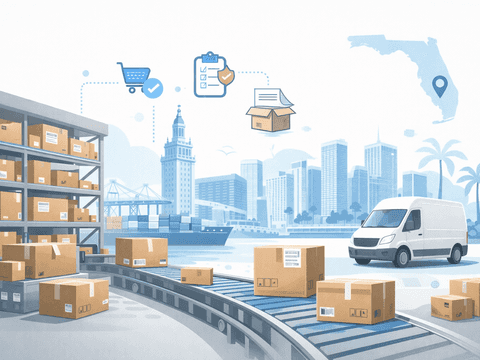What is warehouse management in eCommerce
Warehouse management in eCommerce refers to the organization, control, and supervision of all activities related to the storage and movement of products in a warehouse dedicated to online sales. Its goal is to ensure that products are available and delivered to customers quickly and efficiently.
What is an eCommerce warehouse management software
A warehouse management system (WMS) is software designed to streamline and optimize the daily operations of a warehouse, particularly for eCommerce businesses.
It's more than just moving boxes; WMS centralizes and optimizes tasks across the supply chain to meet the fast-paced demands of eCommerce.
Key functionalities of WMS include inventory control, stock management, picking, packing, ERP system integration, order preparation, and more.
There are several types of WMS suitable for eCommerce:
- Standalone: manages basic processes and is ideal for small eCommerce businesses with a limited number of SKUs
- Integrated: coordinates various processes within the company, such as returns, shipments, and accounting, making it essential for growing eCommerce operations
- Cloud-based: uses web applications and cloud data, offering accessibility and scalability to handle high order volumes and seasonal spikes
- On-premises: requires own servers, offering greater customization but at a higher cost, suitable for large eCommerce enterprises with complex needs
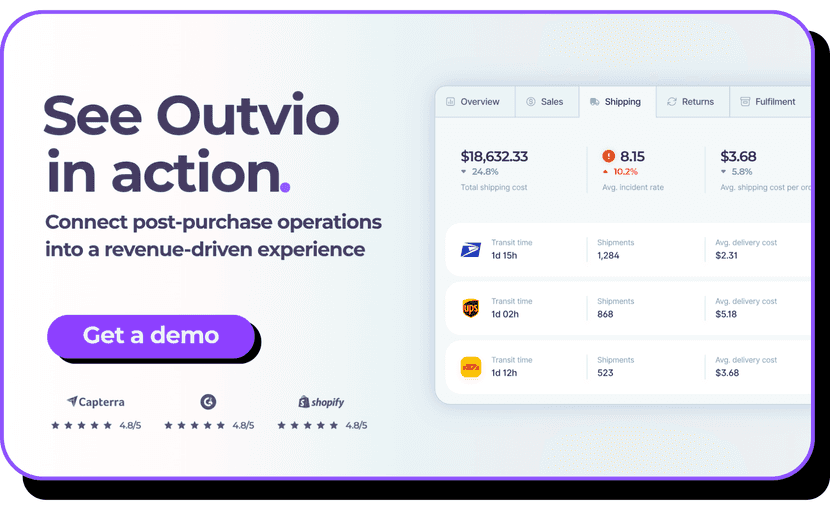
When should you consider using a WMS platform?
There's no exact number of orders that dictates when to use a WMS; it depends on your business's specific needs. Generally:
- If you handle a moderate volume of daily orders, a basic WMS can streamline order fulfillment, ensure timely deliveries, and maintain customer satisfaction.
- For a high volume of orders or multiple logistics centers, a customizable WMS is recommended. It allows your operations to scale efficiently, handle peak seasons seamlessly, and maintain fast shipping times, crucial for eCommerce success.
- Even with a low volume of daily orders or a small warehouse, implementing a WMS can enhance inventory accuracy, reduce errors, and improve the overall shopping experience for your customers.
Evaluate your operational costs and order management complexity. If costs are excessively high or management is becoming more complex and costly, these are clear indicators that you might need a WMS to maintain competitive delivery times and a seamless shopping experience.
Best 14 ecommerce warehouse management systems
1. Softeon
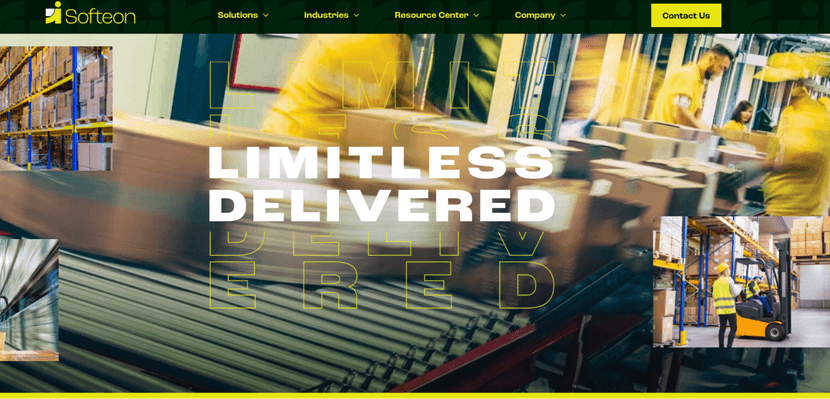
Softeon is a logistics company offering a range of supply chain services, including warehouse management and fulfillment, specifically tailored for eCommerce businesses.
Their WMS software provides extensive automation options and invoice control, making it an excellent solution for eCommerce companies with large warehouses and high order volumes.
Key features
- Barcode and QR code scanning
- Purchase order management
- Low stock alerts
- Product traceability
Starting price: customized
URL: Softeon
2. Zoho Inventory
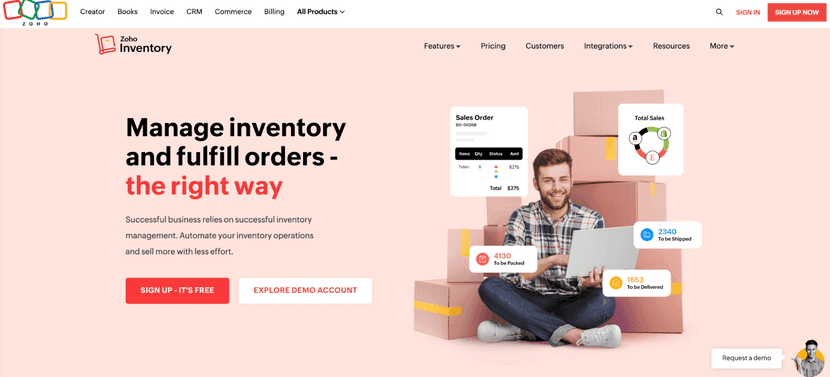
Zoho Inventory is a cloud-based inventory management solution that is part of the Zoho ecosystem.
It simplifies the management of sales and purchase orders, shipment tracking, and control of multiple warehouses, making it an excellent choice.
Main features
- Sales and purchase order management
- Real-time shipment tracking
- Multi-warehouse control
- Integration with other Zoho applications
Starting price: from €39/month
URL: Zoho Inventory
3. Holded
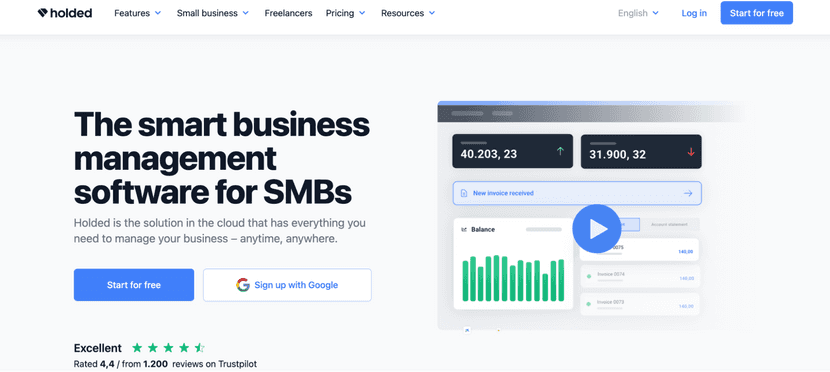
Holded is an all-in-one business management platform designed for small and medium-sized eCommerce businesses.
It includes accounting systems, CRM, project management, and digital inventory control. It also allows you to generate reports or templates, all centralized within its software, making it ideal for streamlining eCommerce operations.
Main features
- Real-time inventory control
- Management of multiple warehouses
- Integration with eCommerce platforms
- Automated invoicing and accounting
Starting price: from €14.50/month
URL: Holded
4. ZenHub
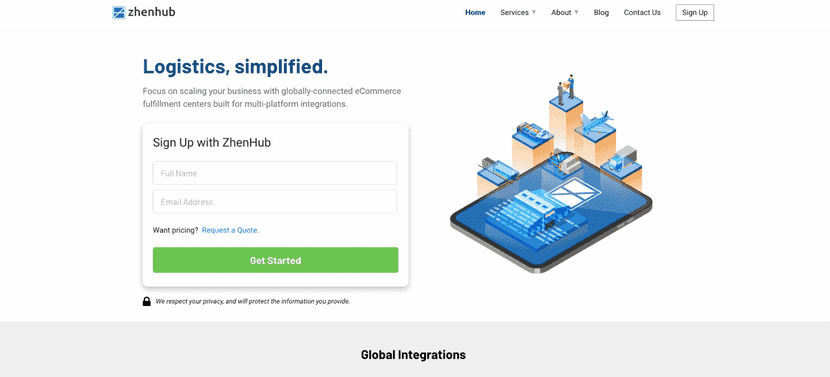
ZhenHub is an ideal platform for online stores looking to take their first steps in optimizing logistics, improving warehouse efficiency, and minimizing shipping issues.
Its strength lies in its integration with eCommerce platforms and logistics tools.
Main features
- Real-time inventory management
- Integration with eCommerce platforms
- Logistics and order fulfillment tools
- Detailed reporting and analytics
Starting price: customized based on business needs
URL: ZhenHub
5. Fishbowl
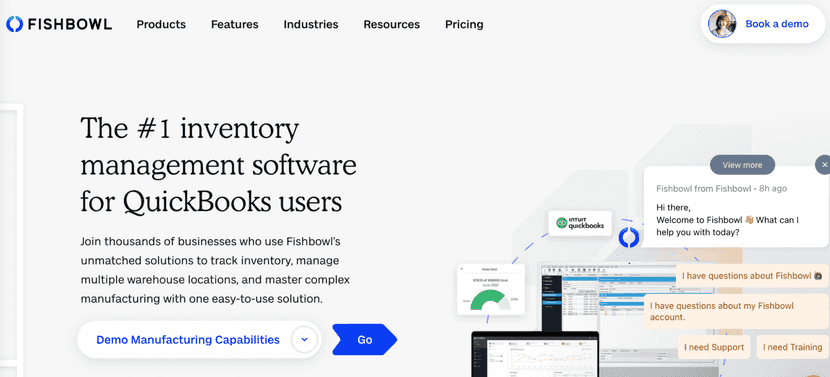
Fishbowl is a WMS system oriented towards large industries.
Its robust system includes purchase and sales order management, traceability, and production planning tools. Additionally, it can be integrated with QuickBooks.
Main features:
- Purchase and sales order management
- Real-time inventory tracking
- Integration with QuickBooks
- Production planning and control
Starting price: customized
URL: Fishbowl
6. inFlow Inventory
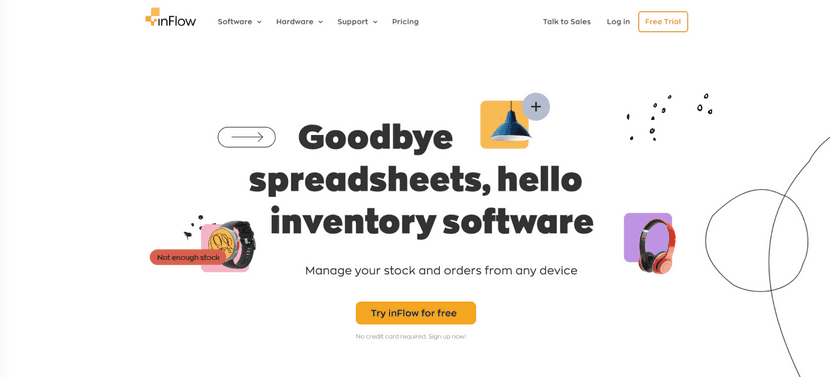
inFlow Inventory is another highly useful WMS for inventory control, purchase order management, and report generation.
It supports barcode scanning and custom label generation, and its intuitive interface makes it ideal for users without prior experience.
Main features
- Real-time inventory control
- Purchase and sales order management
- Detailed report generation
- Integration with QuickBooks and other accounting platforms
- Creation of custom B2B portals
- Mobile apps for management from smartphones
Starting price: from $110/month
URL: inFlow Inventory
7. SAP

SAP Warehouse Management is part of the SAP ERP suite, utilized by large enterprises for comprehensive warehouse management.
It offers advanced functionalities to optimize the supply chain and improve operational efficiency. This system allows full integration with other SAP modules, facilitating real-time inventory management.
Main features
- Real-time inventory management
- Warehouse process automation
- Integration with other SAP modules
- Advanced analytics and detailed reporting
- Support for batch and serial number handling
Starting price: Based on specific requirements and company size
8. Oracle
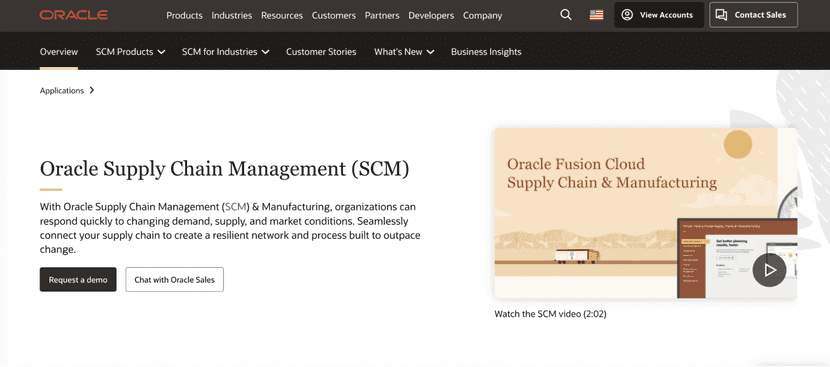
Oracle WMS Cloud is a cloud-based warehouse management solution. Being part of the Oracle ecosystem, it integrates easily with other enterprise systems.
It offers advanced tools for inventory tracking, process optimization, and order management. The system is adaptable for different industries, including eCommerce, manufacturing, and retail.
Main features
- Real-time inventory management
- Warehouse process optimization
- Integration with other Oracle solutions
- Advanced analytics and reporting tools
- Support for managing multiple locations and sub-warehouses
Starting Price: customized based on company size and required functionalities
URL: Oracle WMS Cloud
9. Quickbooks Commerce
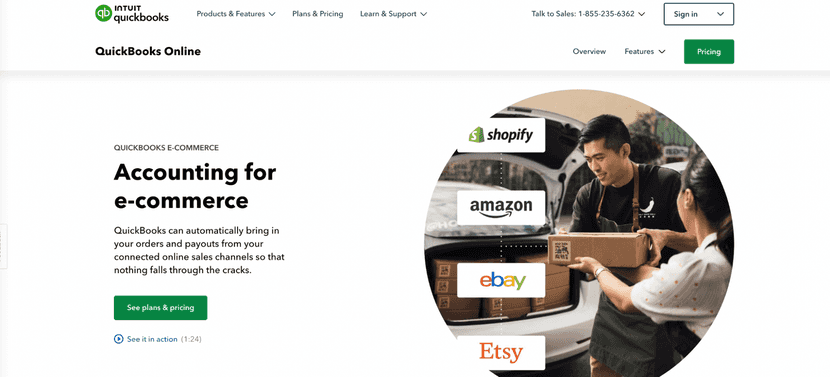
QuickBooks Commerce is an inventory and sales management solution developed by Intuit. The software is designed specifically for small and medium-sized businesses, making it highly intuitive.
This WMS allows efficient management of inventory, orders, and sales across multiple channels, both online and offline.
Main features
- Sales and purchase order management
- Real-time inventory tracking
- Integration with QuickBooks
- Detailed reporting
- Multi-warehouse management
Starting price: from $30/month
URL: QuickBooks Commerce
10. HighJump (Korber Supply Chain)
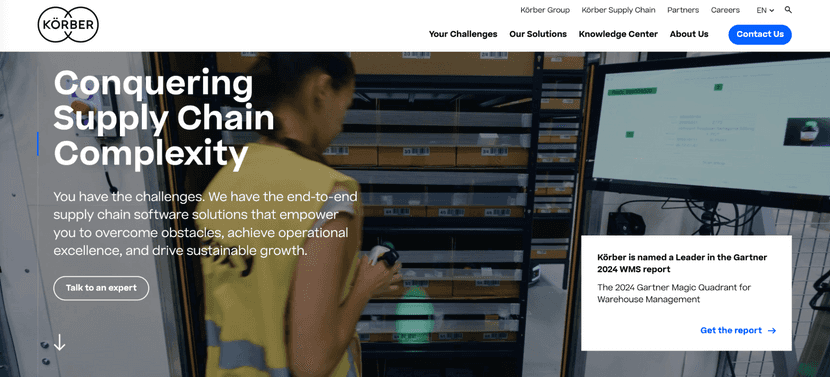
HighJump, now part of Korber Supply Chain, is a warehouse management solution suitable for all types of businesses.
It stands out for developing systems that optimize warehouse management, logistics, and distribution. It offers a cloud-based WMS for inventory control and product traceability.
Main features
- Real-time inventory management
- Warehouse process optimization
- Integration with ERP systems and eCommerce platforms
- Advanced analytics and reporting tools
- Support for managing multiple locations and sub-warehouses
Starting price: customized based on business needs
URL: HighJump
11. Odoo
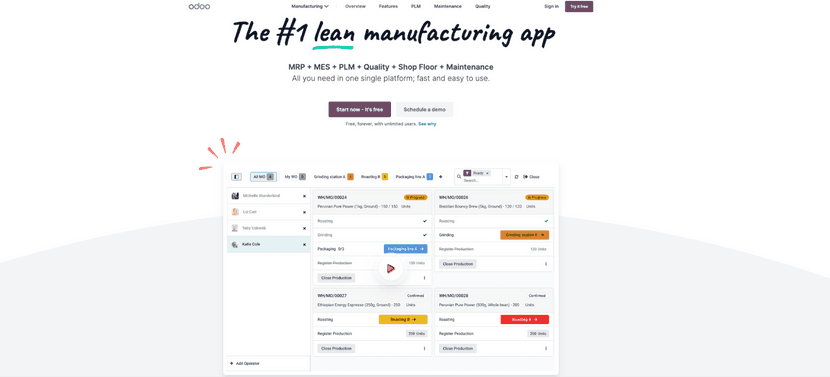
Odoo is an open-source suite of business applications that includes modules for CRM, eCommerce, accounting, POS, project management, inventory, and more.
It offers advanced warehouse management, route optimization, and real-time visibility, making it suitable for all types of businesses.
Main features
- Real-time inventory management
- Intelligent replenishment rules and order automation
- Control of incoming and outgoing shipments with GS-1 codes
- Storage and picking strategies (single, batch, wave)
- Integration with transport systems for shipping label printing
Starting price: free
URL: Odoo
12. EasyWMS
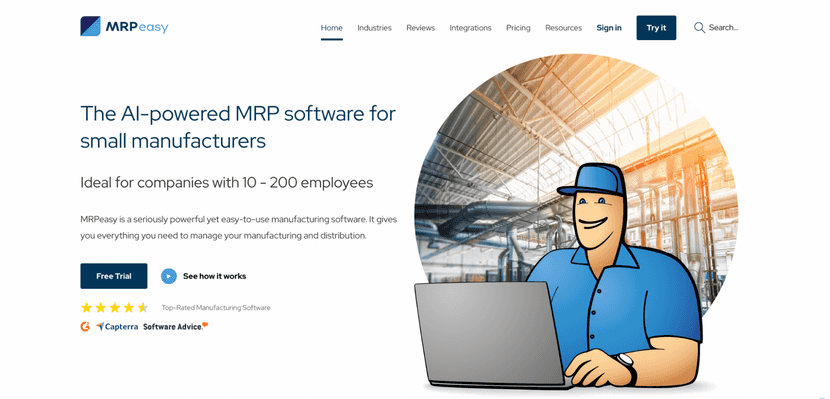
Easy WMS is a warehouse management system developed by Mecalux, designed to improve operational efficiency in the warehouse.
It is suitable for companies seeking a scalable and flexible solution that adapts to their specific needs. Its ability to manage multiple warehouses and optimize logistics processes is notable.
Main features
- Real-time inventory management
- Warehouse and picking process optimization
- Integration with ERP systems and eCommerce platforms
- Advanced analytics and reporting tools
- Multi-warehouse management
Starting price: customized based on business needs
URL: Easy WMS
13. Infor WMS
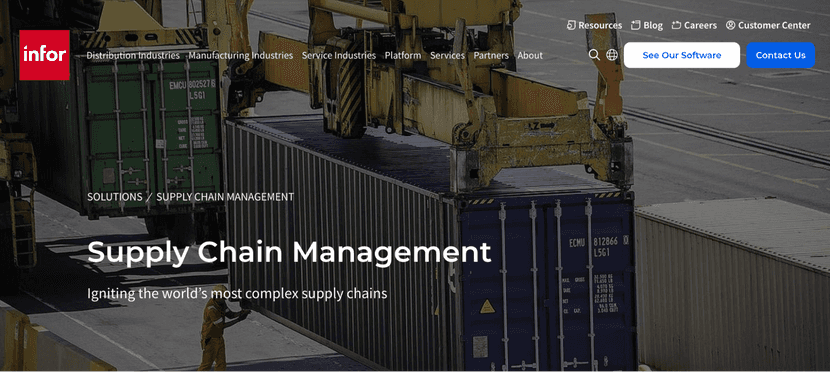
Infor WMS is an advanced warehouse management system that provides a robust solution for inventory management and supply chain optimization.
It can be connected with other systems in the Infor ecosystem, offering seamless integration. This comprehensive, customizable, and scalable WMS is especially recommended for large companies.
Main features
- Real-time inventory management
- Warehouse process automation
- Integration with ERP systems and eCommerce platforms
- Advanced analytics and reporting tools
- Support for batch and serial number handling
Starting price: Customized based on business needs
URL: Infor WMS
14. Made4net SCExpert WMS

Made4net provides a full suite of supply chain execution solutions, including a best-in-class Warehouse Management System (WMS) built to support e-commerce operations at scale. Designed for speed, accuracy, and control, Made4net’s cloud-based WMS helps e-commerce brands optimize inventory, fulfillment, and last-mile execution across warehouses, drop-ship partners, and direct-to-consumer channels.
Main Features:
- Real-time inventory control
- Support for Complex Pick & Pack Methods
- Integration with e-commerce platforms, ERP systems, and carriers
- Returns and reverse logistics management
- Automation and robotics integration
- Scalable cloud architecture
- Data-driven facility & labor optimization
Starting Price: Customized
URL: made4net.com
How to choose the Best WMS for eCommerce
Selecting the right Warehouse Management System (WMS) for your eCommerce business requires understanding your specific operational needs and priorities. Here are some key factors to consider:
1. Understand your operations
Identify your business's specific needs. For instance, if you handle perishable items, you'll need a system with features like temperature control and expiration date tracking.
2. Essential features to evaluate
- Intuitive Iinterface: look for a WMS with a customizable, user-friendly interface to reduce the learning curve for your team and ensure smooth adoption.
- Integrations: ensure the WMS can integrate seamlessly with your existing software, such as your eCommerce platform, ERP, and other essential tools. This facilitates information flow and improves efficiency.
- Automation capabilities: automation in picking, packing, shipping, and real-time inventory management is crucial for increasing efficiency, reducing manual errors, and speeding up order fulfillment. Features like scan to price further enhance productivity by allowing staff to instantly retrieve product pricing with a simple barcode scan, reducing lookup times and ensuring pricing accuracy across the system.
- Scalability: choose a WMS that can grow with your business. It should adapt to expanding product ranges, increasing order volumes, and new warehouse locations without major disruptions.
- Support for various storage types: verify that the system supports different storage methods and optimizes space usage based on your products.
- Reporting and analytics capabilities: a robust WMS should offer tools for creating custom reports and analyzing key performance indicators (KPIs). This will help you track metrics such as order accuracy, fulfillment speed, and inventory turnover.
How long does it take to fully integrate a WMS?
Implementing a standard cloud-based Warehouse Management System (WMS) is relatively quick and straightforward.
Generally, you can install and configure the software within one or two days, depending on the size of your operation.
During this setup, it's crucial to ensure all data capture devices and warehouse hardware, such as scanners and mobile terminals, are correctly configured and synchronized.
For a customized WMS, the process is more complex and involves several steps.
Initially, you'll need to evaluate your existing infrastructure, plan, and design an implementation strategy.
The subsequent software development and configuration will be tailored to your specifications.
This includes customizing modules and functionalities, integrating with other business systems (like ERP and CRM), and configuring specific operational rules and parameters.
Additionally, thorough testing is necessary to ensure the system functions correctly and meets your expectations. This entire process can take anywhere from several weeks to several months, depending on the complexity and scope of the customization.
How much cost the best WMS for eCommerce
| WMS Name | Description | Initial Price | Maximum Price |
|---|---|---|---|
| Softeon | Advanced WMS for logistics companies with large warehouses. | Custom | Custom |
| Holded | Comprehensive platform with functionalities for accounting, CRM, projects, and inventory. | €29/month | €99.50/month |
| Zoho Inventory | Cloud-based inventory management integrated with Zoho applications. | €39/month | €299/month |
| ZhenHub | Cloud platform for inventory management and logistics solutions. | Custom | Custom |
| Fishbowl | WMS for large industries with production planning systems. | Custom | Custom |
| inFlow Inventory | Manages orders, purchases, inventory, and production planning. | $110/month | $549/month |
| SAP | Part of SAP's ERP suite for advanced warehouse management. | Custom | Custom |
| Oracle | Cloud-based warehouse management solution, part of the Oracle ecosystem. | Custom | Custom |
| QuickBooks Commerce | Inventory and sales management for small and medium-sized businesses, developed by Intuit. | $30/month | $200/month |
| HighJump (Korber SC) | Notable for its integration and logistics optimization in warehouse management. | Custom | Custom |
| Odoo | Open-source application suite for advanced warehouse management and route optimization. | Free | €22.40/month |
| Easy WMS | Scalable and flexible warehouse management system developed by Mecalux. | Custom | Custom |
| Infor WMS | Advanced system for inventory management and supply chain optimization. | Custom | Custom |
| Made4net | Full suite of supply chain execution solutions | Custom | Custom |
Why connect your WMS with eCommerce shipping software?
Integrating your wawrehouse management system (WMS) with shipping and transportation software is a game-changer for eCommerce businesses.
This connection streamlines your operations, ensuring quick and accurate order fulfillment, which is essential for keeping customers happy.
By integrating these systems, you can automatically get real-time shipping rates and options from various carriers, allowing you to offer the best shipping choices to your customers.
This not only enhances their shopping experience but also keeps your shipping costs competitive. Automating the generation of shipping labels also reduces manual errors and speeds up the packing process.
Moreover, this integration provides better tracking capabilities, giving customers real-time updates on their orders and building trust through transparency.
It also simplifies managing returns by automating return labels and improving the efficiency of tracking returned items.


